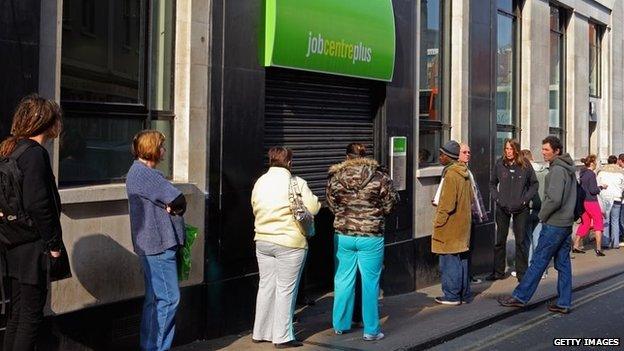Welfare economics: What works best, the carrot or the stick?
- Published

Jaywick is one of the most deprived places in the UK, with a high proportion of people receiving benefits
Even before standing up for today's Budget, George Osborne has made it clear how he justifies making one of the deepest cuts in welfare benefits since the war.
The chancellor talks about "hard-working families", arguing the benefits system needs reforming to "sharpen work incentives" and to "have a welfare system that is fair to those who need it, as well as those who pay for it".
But will benefit recipients rush back to work when you cut their benefits? And can we really be divided into those who pay into the system and those who rely on it?
In the case of one of the biggest benefits it's not that simple - the majority of those receiving benefits are contributors too. The latest figures show that 69% of families receiving tax credits, one of the prime candidates for cuts, have at least one adult in work paying national insurance and/or tax.
Back to work
The tax credit system costs £30bn - vastly more than the few billion Gordon Brown suggested it would cost when he dramatically expanded it 16 years ago. So cutting could be seen as fair to overburdened taxpayers now and in the future - even if some three million of them are also the recipients of those very same tax credits.
But will cutting it make work pay? The economic theory says the work incentive is the difference between your income on benefit and your income in work. You can improve that work incentive with a stick: cutting your income on benefit. Or you can improve it with a carrot by raising your income in work.
In 1999, Gordon Brown chose the carrot.
A study by the Institute for Fiscal Studies found that single mothers in particular had been induced back to work after the expansion of tax credits. No wonder, when they could substantially improve their income, and get help with childcare, if they worked 16 hours a week.

And across the population the carrot had worked, modestly, to induce people back to work. "Under the current system, virtually everyone is better off in work", says Paul Bivand, a leading expert on work incentives from the Inclusion think tank.
So if the carrot worked, what effect will it have when you take that carrot away?
"If you cut out-of-work benefits, you improve work incentives. If you cut in-work benefits, you reduce them," says Mr Bivand.
Incentives to work
Of the average tax credit award of £6,852, a large chunk is the in-work benefit, working tax credit. You collect this if you work 16 hours a week or more and it is designed to incentivise work. Cutting that in-work benefit, according to the IFS, would reduce work incentives, not improve them.
But another chunk is child tax credit. With this, the less you earn, the more you get. The poorest parents will collect £2,780 per child but you can still collect £545 a year if you earn £32,000. Cutting this would reduce the incomes for millions of families, but it would not harm work incentives.
"It is not fair that people out of work can earn more than people in work," Mr Osborne has said, an argument already well-rehearsed when the coalition government announced its plans for universal credit and, later, the welfare cap.
Incentives work when you have a genuine choice, for example between being on benefit and going to work. Not all benefit recipients are in that position. Sickness, personal circumstances or a lack of available work can mean some are not in a position to take them up. If they are in such a position, there are 740,000 vacancies out there.
In 2013 the government capped the amount of benefit families could receive at £500 per week, or £26,000 a year. Only a tiny fraction of benefit recipients got more than that: 27,000 families. It saved an amount equivalent to £100 million - which may sound a lot, but it's less than half a per cent of the welfare bill. A saving to put a dent in the deficit would have to hit far more people and indeed the chancellor is expected to lower the cap to £23,000 in London and perhaps as low as £20,000 outside London.
Of those 27,000 some suffered bit cuts in their housing benefit - up to £46 a week. So were they induced by this stick to go back to work? A study by the Department for Work and Pensions, supervised by the IFS, found that a minority were indeed induced to go back to work. But in spite of being made up to £46 a week poorer, the majority did not.
The IFS concluded: "For this majority, it remains an open question as to how they adjusted to what were, in many cases, very large reductions in their income.".